Share
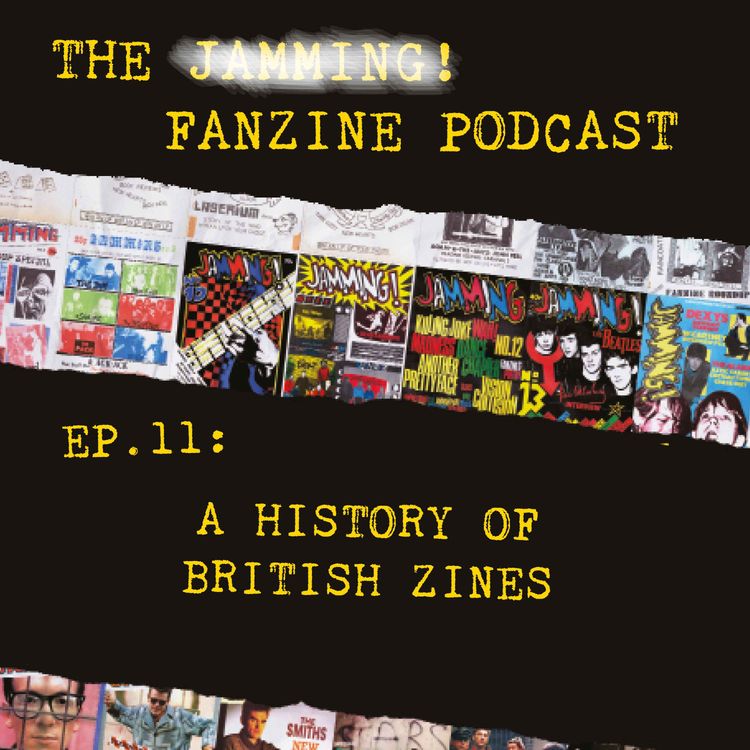
The Fanzine Podcast
Ep. 11: A History of British Zines
THE JAMMING! FANZINE PODCAST is back after a year in exile, now as a Podcast for and about all Fanzines, though still hosted by former Jamming! editor/publisher Tony Fletcher. For this first episode of a new series/season, Tony interviews the authors of the excellent new hardbook book, WE PEAKED AT PAPER: AN ORAL HISTORY OF BRITISH ZINES, namely Gavin Hogg and Hamish Ironside. Before, after and when they could, even during the pandemic, they traveled the length and breadth of the British Isles to track down editors of fanzines dating back to the science fiction era that launched the culture, through the punk, post-punk, new wave, indie and Brit-pop eras of the music fanzines, stopping off to discuss a couple of football fanzines along the way, and ending up in the thriving 2020s world of perzines, compzines, and idiosyncratic little one-off publications in a variety of sizes and some with print runs in the single digits.
It's a fascinating, lovingly compiled, and highly professional book - and the interview covers a similarly wide range of subject matter. Tony, Gavin and Hamish date the first ever British 'fanzine' back to 1936 (Novae Terrae), they debate what defines a fanzine, the commonalities among the various editors they interviewed, the shift from the music press culture (including those of fanzines) as a 'men's club' to the current 'zine fairs predominantly frequented by female editors, the financial struggles experienced by most zine editors, those moments of recognition that make it all worthwhile. And David Icke.
Among the editors and zines referenced in this podcast that were also featured in WE PEAKED AT PAPER:
- Rob Hansen (Epsillon)
- Mark Perry (Sniffin' Glue)
- Mick Middles (Ghast Up)
- Mark Hodkinson (Untermensch)
- Pete Paphides (Perturbed)
- Karen Ablaze (Ablaze!)
- Siaân Pattendon (How to Win Friends and Influence People)
- Saskia Holling (Heavy FLow)
- Saleena Laverne Daye (Without You, I'm Nothing)
- Elias Nebula (The Hegelian)
- and of course
- Hamish Ironside (Soudade) and
- Gavin Hogg (Bag of Tricks and Candy Sticks)
WE PEAKED AT PAPER can be purchased from Boatwhistle books at https://www.boatwhistle.com/we-peaked-at-paper.
Gavin Hogg's podcast, The Giddy Carousel of Pop, is at https://giddypoppod.home.blog/
Tony Fletcher can be found at https://tonyfletcher.net/
Tony's latest music, writing and social media can be accessed from https://linktr.ee/TonyFletcher
One Step Beyond podcast is at https://shows.acast.com/onestepbeyond
The Best of Jamming!: Selections and Stories from the Fanzine That Grew Up 1977-86 is published by Omnibus Press
'The Jamming! Fanzine Podcast Theme' is by Noel Fletcher.
Logo by Greg Morton.
More episodes
View all episodes
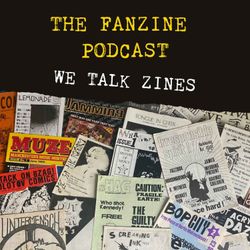
Ep. 37: The Fanzine Podcast wraps up with the RAPMM Fanzine Archive
01:32:10|The latest episode of The Fanzine Podcast, and it is also the last issue of The Fanzine Podcast. We wrap things up with an in-person visit to RAPMM – the RILM Archive of Popular Music Magazines, a digital archive of what are in fact mainly fanzines, 133 titles and counting, spanning genres, decades and countries. While RAPMM is essentially an online archive, it is operated from the City University of New York (CUNY)’s Graduate Center right by the Empire State Building, where many of the fanzines are also physically archived. It is there that host Tony Fletcher went to interview one of the prime archivists behind this project, Lindsey Eckenroth. Lindsey is among the rare Academics who is also a Fanzine Editor: Irrational Exit, which she runs with partner Joe, is a small-scale music zine that demonstrates that the culture is alive and thriving.This Episode 37 runs long, but it is in two distinct parts: the first an interview with Lindsey about RAPMM itself, followed by a fun flick through a variety of physical zines she pulled out of the archives for me to look over and discuss. They include Bomp!, Bam Balam, Blaze, miau!, Razorcake, In Effect, Louder Than Bombas, Hardcore Architecture and more. Dozens of other zines get discussed over the course of the episode.To see covers of some of these zines, screenshots of the RAPMM web site, and to read a longer article about this specific episode, please visit https://tonyfletcher.substack.com/p/the-final-fanzine-podcastTony Fletcher hosts another podcast, Crossed Channels, with Dan Epstein. Find it on your preferred streaming platform; full episodes are available to paid-up subscribers either of our Substack pages. More info at https://tonyfletcher.substack.com/podcast'The Jamming! Fanzine Podcast Theme' is by Noel Fletcher.Logo by Greg Morton.The Best of Jamming!: Selections and Stories from the Fanzine That Grew Up 1977-86 is published by Omnibus Press
Ep. 36: How 14-yr-old Mark Jay's SKUM 'zine immersed him in the '76 UK punk scene
01:22:09|Visit tonyfletchersubstack.com for more show notes, fanzine covers, the Ode To a Better-Badged Boychik poem and more. https://tonyfletcher.substack.com/p/how-14-yr-old-mark-jays-skum-zineMark Jay was just 14 years old in 1976 when, hanging out at the Rock On record shop next in Camden Town, close to his violence-ridden state school, an inadvertent reacquaintance with John Simon Ritchie - a.k.a. Sid Vicious - propelled him into the heart of the fledgling UK punk scene.By the end of that year, Mark had started one of the first British punk fanzines, SKUM, and not only been befriended by Bernie Rhodes, The Clash, and members of the Sex Pistols, but by Malcolm McLaren and Vivienne Westwood, who having seen Mark’s cartoon of the Sex Pistols v. Bill Grundy TV fiasco, commissioned a ‘Story So Far’ from him that became the insert to the Never Mind The Bollocks album. Mark was among the only proper fans, and surely the youngest to attend the Pistols’ Silver Jubilee boat trip/concert on June 7, 1977, at which he was arrested and spend the night in jail. By then he was all of 15. He remembers it to this day as the best gig of his life.Mark ceased publishing SKUM in December 1977, a year after he had started, and indulged his Beat Poetry obsession instead, starting a fanzine called All The Poets, printed in early 1979 by Joly MacFie (featured on Episode 3 of this podcast) at Better Badges, as a ‘guinea pig’ for his new printing press. Around the same time, he allowed my zine Jamming! to cut-and-paste his (first ever) Sid Vicious interview from SKUM 1 for my Jamming! 7, also printed at Better Badges.At the end of September 2025, Mark and I had a real time conversation for the first time in over 46 years, which I recorded in entirety for this, the final UK episode of the Fanzine Podcast. It is, quite possibly, and not as much for the renewed personal connection as for Mark’s incredible origin stories, my favourite episode of them all.Other fanzines mentioned in this podcast: Sniffin’ Glue, White Stuff, Bondage, Ripped & Torn, and London’s Burning.Find Mark on Instagram. Further links:SKUM archivesAll The Poets archivesThe Sex Pistols: The Story So Far posterMark Jay’s Sex Pistols Jubilee boat story and more on sex-pistols.netMark Jay’s films are all listed and linked at the bottom of this page:To order Geshmack x Gesheft via Spinners (and Mark’s next poemtry pamflet ‘Five Years - between the gutter and the galaxies,‘ when published November 2025). Five Years will contain ‘Ode to the Better Badged Boychik at the Favourite Caff,’
Ep. 35: D.C.'s Descenes and Discords with Howard Wuelfing
01:09:32|The Fanzine Podcast is back after an unintentionally long absence to talk with Howard Wuelfing, editor/publisher of two key Washington D.C. zines, which have just been gathered into an eponymous anthology: Descenes and Discords. These influential zines, the first focused on local activities, its successor intended to gather additional material about the national alternative/underground scene, ran between 1979 and 1981 and served not only to influence and impact upon music in D.C., but provided publication space for a number of writers who would go on to national prominence, among them Gerard Cosloy and Byron Coley.In this episode, Howard discusses abandoning plans to become a lawyer to focus on becoming a rock writer instead, how exposure to CBGB’s but especially the publication New York Rocker set him and his partners on their way with Descenes, how they were able to access typesetting, advertising and printing, and their successful game plan for distribution, but how the careerism of local “new wave” bands caused the team to pack it in after six issues. Embarking eight months later with Discords, the new look monthly zine had a winning run of cover artists (from Pylon to Circle Jerks to The Bongos and Mission Of Burma) and provided space and encouragement for the younger generation of hardcore bands who would soon step into the space Discords helped create. Accordingly, Ian MacKaye of Teen Idols, Minor Threat, Fugazi and Dischord (no relation) Records, was interviewed by Howard for a special reflection article that opens the new anthology.Descenes and Discords: An Anthology is available from DiWulf.com in the Americas, and EarthIslandBooks.com in Europe. Howard Wuelfing can be found at https://www.howlinwuelf.com/The theme music for the Fanzine Podcast is by Noel Fletcher.The outro in this episode is the 12” mix of “Put It Down” by The Dear Boys, available at thedearboys.bandcamp.comTony Fletcher can be found at tonyfletcher.substack.com
Ep. 34: Kill Your Pet Puppy with Tony D.
01:13:42|In early 1979, Tony D(rayton) ceased publication of his trailblazing punk fanzine Ripped & Torn, having experienced a seismic shift in his values by the emergence of anarcho-punks Crass on the scene. After nine months traversing Europe and rethinking his “decadence,” he came back to London and started a new fanzine, Kill Your Pet Puppy. Like its predecessor, KYPP proved highly influential, and at times equally controversial, gradually moving away from music coverage over the course of its six issues to become something more…In this, his second appearance on The Fanzine Podcast (check Episode 13 for the Ripped & Torn story), Tony D. talks about his conversion to the Crass way of living, his sojourns in Europe, falling out with Adam Ant, falling in with a new squat scene, why Kill Your Pet Puppy initially had a far more shocking title, gaining the printing patronage of Joly MacFie at Better Badges, testing the boundaries of what a punk zine could achieve and represent, the attraction of the new ‘Positive Punk’ groups like Alien Sex Fiend, Southern Death Cult and Sex Gang Children, why he launched KYPP with an attack on host Tony Fletcher’s Jamming! fanzine, and why he eventuallyran off to join the circus. Literally.For the full unedited interview with Tony D., and for more about fanzine culture in general, please visit https://tonyfletcher.substack.com/p/kill-your-pet-puppy-and-other-popThe Kill Your Pet Puppy archives are at https://killyourpetpuppy.co.uk/news/the-complete-set-of-kill-your-pet-puppy-fanzines/The Fanzine Podcast Theme is by Noel Fletcher. Logo by Greg Morton.The Best of Jamming! Selections & Stories from the Fanzine That Grew Up 1977-86 is available from Omnibus Press and other online retailers.
Ep. 33: What A Nice Way To Turn Seventeen with Chris Coleman
01:10:56|For the 33rd installment of the Fanzine Podcast, we welcome Chris Coleman, former editor of at least two important ‘zines from the 1980s post-punk UK Midlands: Stringent Measures and What A Nice Way To Turn Seventeen. The first of these zines straddled a vibrant local indie scene that included the likes of Eyeless In Gaza, In Embrace, Attrition, and the Glass Records label (about which Chris put together a special edition) along with Chris’s evident excitement for early U2. What A Nice Way To Turn Seventeen, while maintaining the fanzine format, declared itself musically with a first issue featuring interviews with The Waterboys, The Alarm - and Johnny Thunders, to whom it later dedicated a special issue (as it did Marc Bolan). WANWTTS also put out physical vinyl – EP’s and albums alike - that included the likes of The Jazz Butcher, Jasmine Minks, The Membranes, Mike Scott and Nikki Sudden, and which therefore continued to place the zine at the heart of the mid-80s indie music scene. To this day, Chris continues to release records of lost archived recordings on his Seventeen label.Chris spent a Friday night indoors chatting with podcast host Tony Fletcher about his fanzine experiences back in the day. Other fanzines mentioned in this episode include Bucketful Of Brains, Alternative Sounds and Adventures In Reality, and the conversation also diverges into the likes of R.E.M. and The Smiths. We get to hear how Chris’s parents once collated and stapled and distributed zines for him while he was on holiday, and we find out which of the aforementioned musicians once commented to him, “You have great veins.” (Hint: it should be obvious.)Visit https://tonyfletcher.substack.com/p/what-a-nice-way-to-turn-seventeen for images of some vintage What A Nice Way To Turn Seventeen, to find similar posts and pages dedicated to earlier Fanzine Podcasts, and for Tony’s twice-weekly writings.Thanks to Noel Fletcher for the theme music, and Greg Morton at Omnibus Press for the logo template.The Best of Jamming!: Selections and Stories from the Fanzine That Grew Up 1977-86 is available from here.
Ep. 32: Search & Destroy
01:12:36|It’s time for a new episode of The Fanzine Podcast, and we start 2025 off with one of the pioneers from the explosion of punk zines in 1977: V. Vale, editor and publisher of San Francisco’s legendary Search & Destroy along with its successor, RE/Search Publications.Now in his late 70s, Vale – who grew up in foster homes in the Midwest and found refuge in public libraries – has been active in the U.S. counterculture pretty much all his life. He attended U.C. Berkeley during the Free Speech Movement of 1964-65, was active on the city’s hippy scene, worked at the equally legendary City Lights book/magazine shop, and was on hand when San Francisco’s first punk bands – Crime, Nuns, The Avengers, Sleepers, Negative Trend among others – emerged in 1977, at which point he decided to document the culture. Basing Search & Destroy on the format of Andy Warhol’s Interview magazine (founded in 1969), Vale’s preferred newspaper print and unadulterated Q&A format combined with the energy of those interviews and the explosive visuals of its layout to make Search & Destroy a must-read zine far beyond the city’s borders. This was just as well given that Vale reckons it took two years to get 200 people on board the SF punk scene but that he printed 5000 copies of that debut issue, helped by donations from Allen Ginsberg and Lawrence Ferlinghetti. ...To read on, to see examples of Search & Destroy and RE/Search, please visit https://tonyfletcher.substack.com/p/search-and-destroyTo order from RE/Search Pubs, visit researchpubs.comThanks to Noel Fletcher for the theme music, and Greg Morton at Omnibus Press for the logo template.The Best of Jamming! is available via https://omnibuspress.com/products/the-best-of-jamming-published-on-23rd-september-2021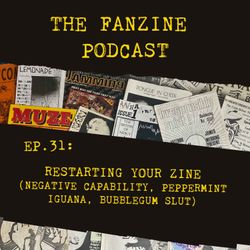
Ep. 31: Restarting an old Zine
01:22:54|For more information, pictures, how to contact the zine editors, and zine updates, visit https://tonyfletcher.substack.com/p/relaunching-your-fanzine Most fanzines are not designed to be permanent: their editors grow up, get "proper" jobs, start families, or just grow bored and want to move on. But occasionally, years down the line, fanzine editors come back around and decide to have another go at it. For this episode, we welcome back from Episode 17 Alison B, whose Confessions of an Ex-Zine Editor, dedicated to exorcising the addictive demons created through her original zine Bubblegum Slut, has resulted in a Guest Ex-Editor 'zine, for which she cajoled and convinced 14 other ex-editors to resurrect their zines, if only for 2-3 pages. Two of those ex-editors, Jøsh Saitz of Negative Capability, and Clint Evans of Peppermint Iguana, are now at work on new print issue after years away, and they join Alison, and host Tony Fletcher, in discussing why they would want to go through it all over again. Listen on to learn what an Adult Activity Book looks like, why Jøsh named his son Damon, why Clint was going off to Turkey the day after our interview, and whether Alison puts fake fur on her back covers (hint: she does).Other zines mentioned: Black Velvet, Abaxis, Artcore, Lunchtime For Wild Youth, Meal Deal Zine, Festival A, Golf Sale, Pretty But Schizo, Adventures In Reality, Pint Sized Punk, Myth & Lore, Mondo Grebo,.Please visit https://tonyfletcher.substack.com/p/relaunching-your-fanzine for way more content.Thanks to Noel Fletcher for the theme music, and Greg Morton at Omnibus Press for the logo template.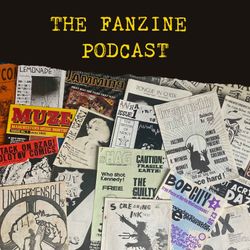
Ep. 30: Adventures in Eurock and Neumusik
58:33|In 1973, a Californian by the name of Archie Patterson became so enthused by all the interesting underground European experimental/electronic music he was hearing that he started up a fanzine dedicated to it, called Eurock. It lasted 40 issues, through 1990. In 1979, a Brit by the name of David Elliott felt much the same way and, in part inspired by Eurock and also by post-punk DIY culture, started his own zine Neumusik. While it only lasted 6 issues, until 1982, during that time it grew to over 70 pages and set David off exploring Europe to interview many of the important artists in person.What kind of artists are we talking about? Some of them you may know, like Can, Tangerine Dream, Kraftwerk, Nektar, Neu!, Heldon, Chrome, or Urban Sax.. Others you may never have heard of, like Guru Guru, Asmus Tietchens, Atem, Art Zoyd III, Gunter Schickert, or Shub Niggurath. All of them were at the forefront of musical creativity towards the end of the 20th Century, and Eurock and Neumusik were at the forefront of the fanzines writing about them, interviewing them, and cataloguing their culture. Patterson grew a distribution service and began publishing books; he still posts twice-weekly about the music on his Facebook. Elliot started a “band,” a cassette label, and recently wrote an extensive book on the British pop music of 1984.For more information about their zines, their culture, and where to get copies of their books, please head on over to https://tonyfletcher.substack.com/p/adventures-in-neumusik-and-eurock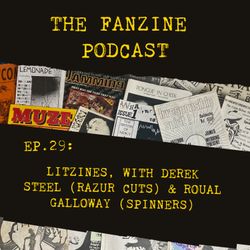
Ep. 29 : The Flourishing Litzine Scene
01:11:05|For Episode 29, Tony's guests are Roual Galloway of Spinners, and Derek Steel of Razur Cuts, two of the more prominent among the many Litzines currently flourishing in the UK (and beyond).Litzines – independent zines of literature from outside the mainstream – are surely among the oldest of all forms of fanzines. Depending on your historical perspective, you could even argue that they predate the concept of the fanzine itself, which as noted back on Episode 21, was a word first knowingly used in 1940.Certainly, self-published zines of prose and poetry writing were an important part of the Beat culture on both US coasts through the 1950s and 1960s, have an anchor in the current vibrant world of perzines, and have been especially strong in the UK ever since the emergence of a new generation of poets in the early 1980s. These were people encouraged by the examples of cross-over artists like John Cooper Clarke and Linton Kwesi Johnson, and aided by the support of rock artists like The Jam’s Paul Weller, and they took to the pubs and small theaters of the UK to reclaim the form “for the people.” In the UK, the medium, in prose and short story form too, has also always had a close connection to the football terraces and others aspects of pop culture, and recent issues of Razur Cuts and Spinners, each weighing in at about 80 pages, readily demonstrate as much...For more info, including photos, more words, and more links, please visit https://tonyfletcher.substack.com/p/the-flourishing-world-of-litzines